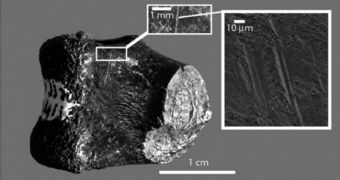Scientists discovered some time ago that our ancient ancestors experienced a surge in brain capacity and cognitive abilities millions of years ago, but they had very little information about other things going on at the same time. Now, new excavations conducted in Kenya, near Lake Turkana, evidenced data on the diets hominids followed about two million years ago, researchers say. During that critical evolutionary moment, the proto-humans ate fish, crocodile and turtle meat, a fact that may have contributed significantly to the development of their then-small brains, Wired reports.
All of these creatures are laden with fatty acids, substances that have a highly-beneficial effect on the development of the human brain. Even now, various food supplements and diet pills contain these chemicals, as they have not lost their ability to positively influence our cortices. At the Kenyan site, investigators uncovered fossilized fish, turtle and crocodile bones right alongside tool fragments dating from the same period. This could only mean that our earliest ancestors were consuming very healthy and beneficial foods, a perk of having large brains. It could be that their diets evolved partially influenced by what they ate, as their cognitive abilities improved over time.
“We know that the hominin brain was growing at this time, but we’ve had little evidence that people were able to increase the quality of their diets. It may be that this was part of a broader hominin pattern,” says David Braun, a dig team member and an archaeologist at the University of Cape Town, in South Africa. Details of the new investigation appear in the June 1 issue of the esteemed scientific publication Proceedings of the National Academy of Sciences (PNAS). The document shows that all of the recovered fossils were preserved in sediments, which allowed them to endure the passing of time.
The researchers are still unsure as to which of our precursor species left behind the fossils. There are a number of potential candidates, including Homo habilis, Homo rudolfiensis, and Paranthropus boisei. The latter is an ancient hominid species that at one time in the past lived near and around Lake Turkana. All of these species had a small brain, as well as a small-body, but one of them most likely evolved into Homo erectus, one of the most likely candidates as a direct candidate to our own species, Homo sapiens. The evolutionary moment that saw one species lead to another is, however, still shrouded in mystery, and experts are working hard at clearing this riddle out.

 14 DAY TRIAL //
14 DAY TRIAL //